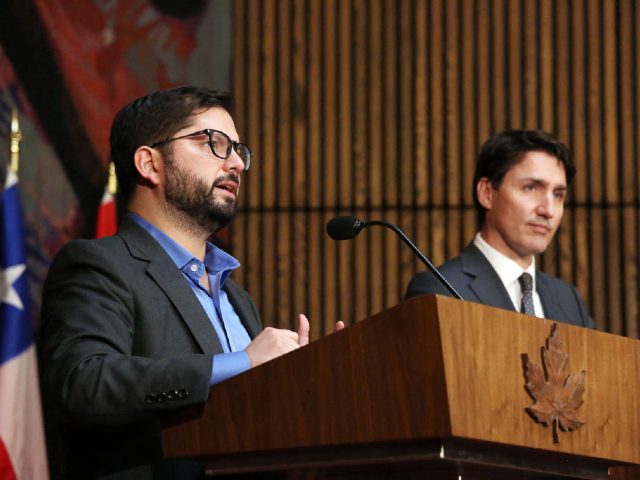Chile’s far-left President Gabriel Boric said on Monday that he hoped to “imitate” a policy implemented by leftist Canadian Prime Minister Justin Trudeau that would significantly limit gun ownership in the country.
Boric made the remarks while visiting Canada. Both leaders are expected to attend this week’s Summit of the Americas in Los Angeles, California.
“We have discussed details about the firearms restriction policy that has been promoted in Canada for quite some time, which has had very good results and which, in Chile, we also want to precisely imitate as well, because good ideas are great to replicate in our countries,” Boric said in a joint statement with Justin Trudeau at the end of the diplomatic encounter.
In the same statement, Boric called for international firearm control legislation.
“We have to promote international legislation. Hopefully an awareness will be generated, beyond our borders, that the possession of firearms is bad for societies,” Boric asserted. “That is why we do it from Chile to Canada, hopefully with all the countries that are close, hopefully it will be of some use.”
The meeting between Boric and Trudeau took place a week after Trudeau announced a complete freeze on handgun sales in Canada. Boric’s gun control statements in Canada are a continuation of his government’s ongoing push towards firearm control in Chile.
On May 19, Chile’s Ministry of Interior and Public Security presented the “Fewer Guns, More Safety” program. Through it, the Chilean government will seek to establish a legal framework to reduce both legal and illegal access to firearms in Chile.
Before traveling to Canada, Boric, in his first annual speech as president on June 2, called for a total ban on gun ownership in Chile.
“Armed violence will not be tolerated in our country. And that is why our ‘Fewer Guns, More Security’ Program proposes the radical limitation of its legal access,” Boric said in his annual address.
Additionally, he asked the Chilean congress for “all support to pass a law that allows us to move towards the total prohibition of possession of weapons and at the same time strengthen the institutional framework.”
“A Chile without firearms is a safer Chile,” Boric added. According to the Investigations Police of Chile, there were a total of 50 reported firearm related deaths in January 2022, up from 35 in January 2021.
Currently, Chilean law allows any resident over the age of 18 to legally own up to two firearms, provided they go through an extensive procedure which includes registering with the national firearm authority, obtaining psychiatric approval, and passing an official exam on the proper use and maintenance of firearms. Obtaining a carry permit for said firearms is a completely separate process and certain firearm types, such as semi automatic, are outright forbidden by law.
Chile and its citizens have been victims of continuous leftist violence and rioting since 2019, when then-President Sebastián Piñera faced condemnation because the capital, Santiago, proposed a fare hike for public transportation. The alleged fare hike protests rapidly morphed into acts of terrorism with no overt relation to the Santiago subway: multiple churches burned down, supermarkets looted, and residential communities attacked.
Violent attacks continued through last year’s presidential election, when leftists supporting the winner, Boric, assaulted family-friendly campaign events for rival José Antonio Kast. Boric did little to stop the attacks.
As a result of the ongoing wave of violence unleashed by leftist protesters, Eduardo Vergara, Chile’s undersecretary for crime prevention, lamented on a radio interview held on April 18 that Chile is experiencing “its worst security moment since its return to democracy.”
During a May Day celebratory march in the Meiggs barrio (neighborhood), Chilean journalist Francisca Sandoval was shot in the face. Saldoval died after being in ICU under critical condition for 11 agonizing days. Protesters disturbed a silent vigil honoring her memory.
On May 14, a group of armed delinquents broke into the house of Chilean Defense Minister Maya Fernández Allende. While she was not at home at the time of the incident, the perpetrators, who made it out with stolen electronic devices and a vehicle, punched her son and handcuffed her husband. Fernández Allende is the granddaughter of Salvador Allende, Chile’s socialist president overthrown by Augusto Pinochet in 1973.
That same night, one of the drivers of the presidential escort was assaulted by three unidentified men. The bodyguard was shot in his arm. Perpetrators threw the victim on the street and took away the stolen government vehicle.
Shortly before these attacks, Boric pleaded with the same leftist groups he once supported to stop “normalizing violence.”
The continued violence has caused huge fluctuations in President Boric’s approval rating. Boric’s approval rating plummeted from 50 percent down to 36 percent a mere month after he began his presidency — bumping back to 44 percent after his first annual address.
Christian K. Caruzo is a Venezuelan writer and documents life under socialism. You can follow him on Twitter here.

COMMENTS
Please let us know if you're having issues with commenting.